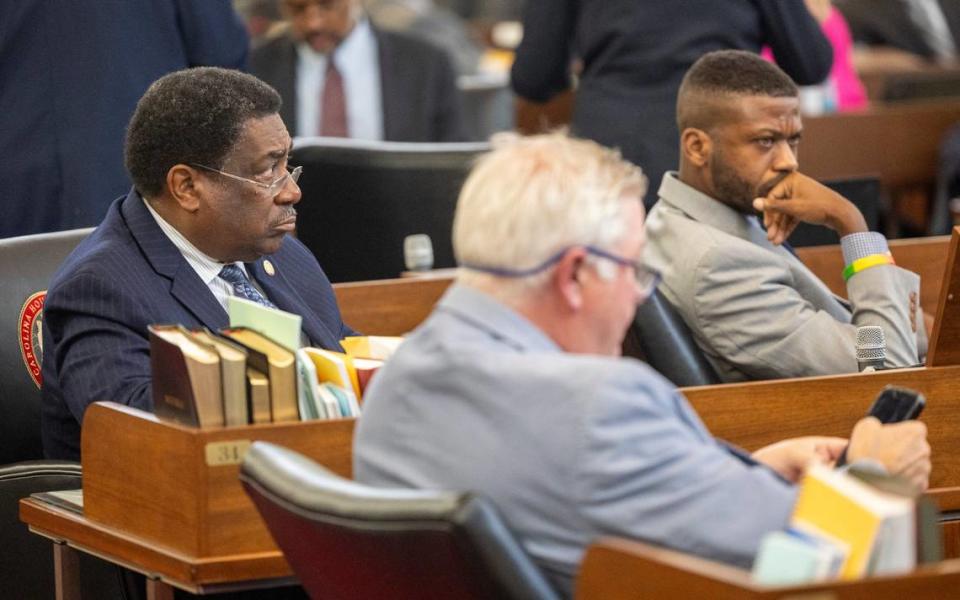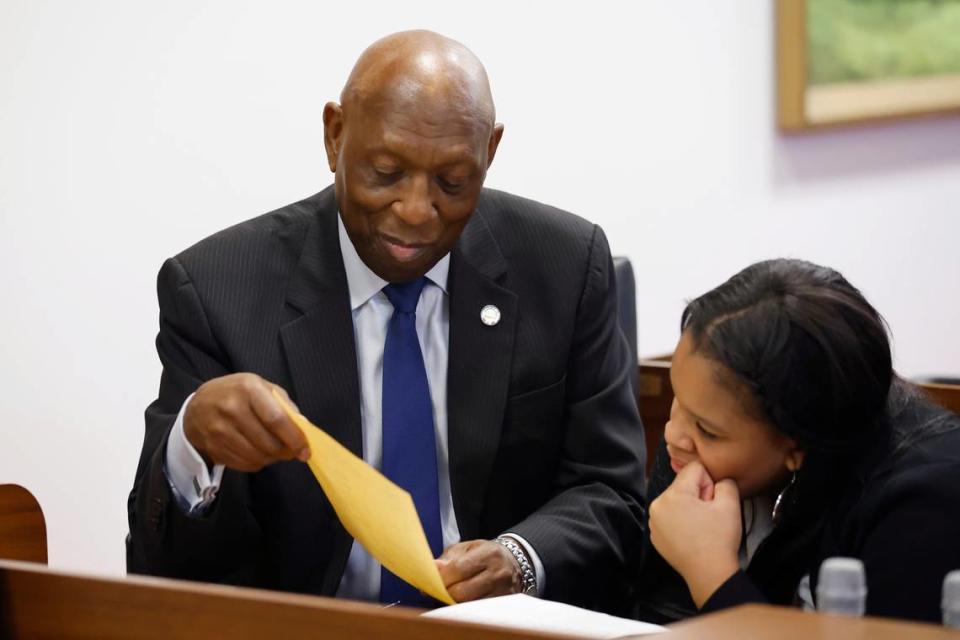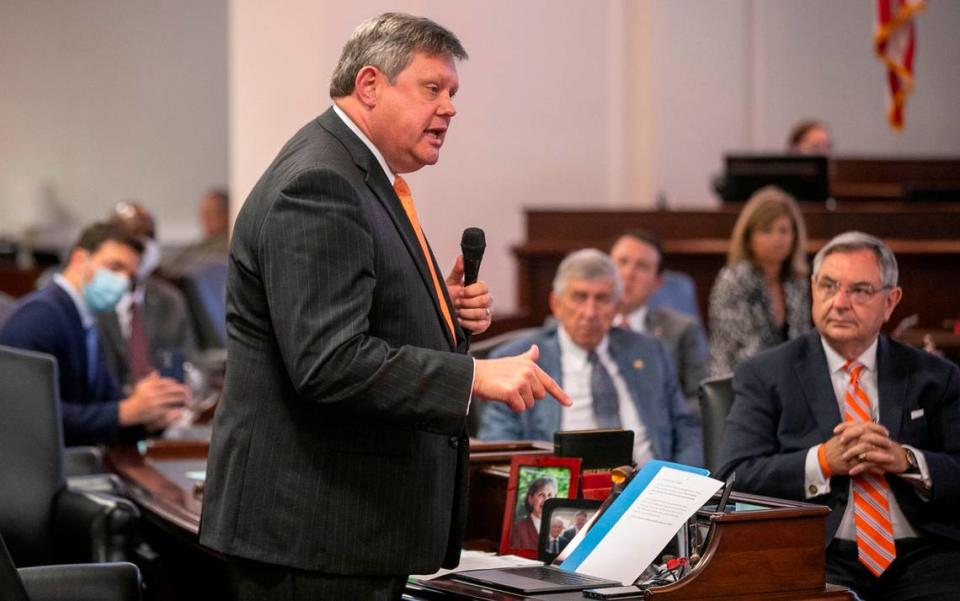A ‘big tent’ party? After defeat of two long-serving NC Democrats, the debate rages on
After formidable primary challenges took down two long-serving legislative Democrats this week, party activists backing the challenges touted the results and said other moderate Democrats should take note and listen to their dissatisfied constituents.
But two House Democrats, both of whom faced primary opponents as well, said the defeats of Rep. Michael Wray and Sen. Mike Woodard were nothing to celebrate, and could become something Democrats come to regret in the future.
Rep. Cecil Brockman, who appeared to narrowly survive a tough primary challenge, and Rep. Shelly Willingham, who handily won against an opponent who posed less of a threat, told The News & Observer that Democrats were losing valuable members in Wray and Woodard who had proven records of delivering for their districts during Republican control of the legislature.
Brockman said he believed Wray’s defeat was meant to send a message to himself and other Democrats who have drawn scrutiny within the party for voting with Republicans on certain bills. But he said he wasn’t fazed by the warning to “fall in line,” and would continue to vote for legislation that he thinks is best for his district, as his constituents expect him to.
Willingham said his approach would remain the same as well: district first.
“It boils down to the fact that people just cannot live with the fact that there’s disagreements (between) us,” Brockman said in an interview. “But I’m sorry, you’re going to have to live with the fact that you may have disagreements with me, you’re not going to scare me; I’m not scared over these results.”
Dozens of votes the difference in two key races
With all precincts reporting, Brockman appears to have defeated James Adams, a former president of the High Point NAACP, by just 83 votes. Wray appears to have lost to social studies teacher Rodney Pierce by an even narrower margin of 42 votes.
These are unofficial results, and won’t be certified until any eligible provisional ballots that were cast are counted.
Pierce, who is also the plaintiff in a federal lawsuit challenging a new GOP-drawn electoral map, said in an interview that he had the edge in his race because his campaign focused on highlighting Wray’s voting record and showing his constituents that it wasn’t beneficial to them.
“The whole campaign was about facts, evidence, data, just letting the people decide who they felt would be their best representative,” Pierce said.
“One of the things that we said was that the rhetoric, his rhetoric didn’t match his record, you cannot vote with Republicans 85% of the time in some sessions” and “continue to call yourself and campaign as a Democrat,” he said.
As for whether he would ever consider working with the majority, Pierce said: “I’m not going to compromise for a short-term gain for a long-term loss.”
Wray did not respond to multiple requests for comment from The News & Observer.
Adams, meanwhile, said in a statement on Tuesday night that Brockman’s constituents had sent a “clear message” that they were unhappy with his performance.
Brockman said he was proud to have won by running a “100% positive” campaign in the face of several attacks, including the unfounded claim he said he heard while on the campaign trail, that he would switch parties after the election. Brockman said he vowed to his constituents that “while I represent you I will always remain a Democrat.”
“Why would I switch parties, I represent more Democrats than those who came after me,” Brockman said in a statement. “The extreme left will have to learn that Democrats only win in NC being a big tent. They are not the only people in this party, they are not the majority of this party. And they are going to have to learn to deal with that.”
Last year, amid speculation that other Democrats could follow Rep. Tricia Cotham’s decision to switch parties and join the GOP, Brockman told The N&O he was a “lifelong Democrat” and was committed to staying in the party and helping Democrats win more elections.

‘Purity tests will be the death of my party’
Defending Wray on social media this week, Brockman said that the 10-term Democrat from Northampton County had given more money to the House Democratic Caucus to help elect other Democrats than anyone else, and that Tuesday’s results were “no victory.”
“Mark my words, purity tests will be the death of my party,” Brockman wrote.
House Minority Leader Robert Reives told The N&O other Democrats over the years had given more to the caucus than Wray had, but said he appreciated Wray’s contributions.
Campaign finance records show that Wray has donated tens of thousands of dollars to House Democrats in recent election cycles. In the third quarter of 2020 alone, Wray gave the caucus $50,000 from his campaign committee.
“These races aren’t won off of hopes and dreams,” Reives said, adding that giving back to the caucus is what is expected of every member, and that other Democrats in heavily blue districts often make six-figure contributions to help candidates in tougher races.
Brockman also said he believed the more serious primary challenges he and Wray faced, which were supported by the Young Democrats of North Carolina and other party-affiliated groups, wouldn’t have happened without the blessing of top party leaders.
“They don’t do this without direction directly from the top, that doesn’t happen,” Brockman said. “They were too scared to try and put their fingers on it, and they tried to let the Young Democrats take the lead. But anybody who knows anything about politics knows that this came 100% from the top.”
Reives said the House Democratic Caucus had nothing to do with any primary challenges, and noted that lawmakers face primary opponents every cycle. The caucus never gets involved, he said.
In a statement, the Young Democrats said they challenged party “defectors” like Brockman and Wray “because it was abundantly clear that they were out of step with their community’s values and their community sought a change.”
“We made a commitment to hold them accountable. Representative Brockman is free to speculate about how wide-spanning the disapproval of him is within our party,” spokesperson Garrett Readling said. “We look forward to going all in for all of our Democrats in November — Rep. Brockman included. We hope to see the same from him.”

Willingham, who has represented Rocky Mount in the House since 2015, said in an interview that it is “unfortunate that the party sees some of these members as ones who are not supporting the whole idea of the party platform” because of their work across party lines.
Brockman, Wray, Willingham, and two other House Democrats, Reps. Garland Pierce and Carla Cunningham, drew the ire of the Young Democrats last year after they joined Republicans in voting for the GOP budget. Willingham also joined House Speaker Tim Moore and two other Republicans in co-sponsoring an anti-rioting bill that Gov. Roy Cooper didn’t veto, allowing it to become law without his signature.
The $30 billion budget included a slew of Republican policies that most Democrats strongly opposed, like the approval of universal school choice and accelerated tax cuts, as well as anti-transparency provisions that drew alarm from open government advocates. But Democrats who voted for it said the budget included tens of millions of dollars needed to improve infrastructure and fund services in their poor, rural districts.
“I think the party should really be supporting us because nothing would happen in many cases if we don’t have people who are willing to talk to folks on the other side of the line,” Willingham said.
He said that he would continue to work with “anyone who is doing something or proposing things that will benefit my district.”
“My district comes first. And that’s first even before the party label,” he said.
Working with Republicans, bringing money home
Other Democrats who have worked with the GOP who faced challengers on Tuesday included Cunningham, who has served in the House since 2013; Woodard, who has served in the Senate since 2013; and Sen. Paul Lowe of Winston-Salem, who has served in the Senate since 2015.
Cunningham and Lowe beat their challengers by comfortable margins, but Woodard lost by 15 percentage points to Sophia Chitlik, a former organizer for the Obama campaign.
It was the first time in a decade that Woodard had faced a challenger. He faced criticism for voting to override Cooper’s veto three times last year for relatively noncontroversial bills about sales tax and changes to the Consumer Finance Act, as previously reported by The N&O.
Woodard previously told The N&O that in a GOP-controlled legislature, minority party members need to work with the majority. The N&O could not reach Woodard for comment on this article.
For Willingham, “the people went after Mike.”
“He had a lot of organized groups working against him,” he said, and “I think that they are going to regret what they did because he did a lot for that district in bringing resources. And of course, the person going in new, they’re (a) freshman, they will have no influence at all.”
Willingham said he and Woodard did not support a “whole lot of Republican things but there were certain things that were beneficial to our districts.” He said that through the state budget, they were able to negotiate for their constituents.

Under the budget, Durham County will receive over $62 million for the next two years in special projects and programs, The N&O previously reported. The more powerful a lawmaker is in a district, the more money they are generally able to pull in for their constituents.
Brockman’s district, which covers High Point, is expected to receive $29 million, while the counties Wray represents, Halifax, Warren, and Northampton, will get a combined $66 million.
Willingham’s district encompasses Bertie, Edgecombe and Martin counties. Cumulatively, these three will receive just over $50 million for the next two years.
“I hope our party, the Democratic Party,” considering it’s in the minority, can “start looking at how we can work with the other side to get things done. Because if we don’t, then we’re gonna get further and further behind at what we’re trying to accomplish,” he said.
Chitlik said Woodard has a “long track record of service in our community” and “he has many people in our community who love and respect him and including many of the people who voted for me.”
Instead of focusing on whether Woodard lost due to working with the GOP, Chitlik said she thinks “voters were ready for new energy and new vision. I think Durham is an incredibly vibrant and progressive community that stands with Gov. Cooper and his progressive agenda for our state.”
She said was “excited to make our state Senate more representative of our community and our population here in North Carolina at large. We have very few women, and very, very few women with young children serving in our state Senate and it’s absolutely critical to the future of the policies that matter to caregivers to have more working parents in office.”
Lowe said his situation is different from some of the other Democrats who faced challengers because while he has supported some GOP legislation, he never voted to override the Democratic governor’s veto.
As for Democratic incumbents being challenged, Lowe said: “That’s a part of democracy. That’s democracy in action. Everyone has the right to run.”


